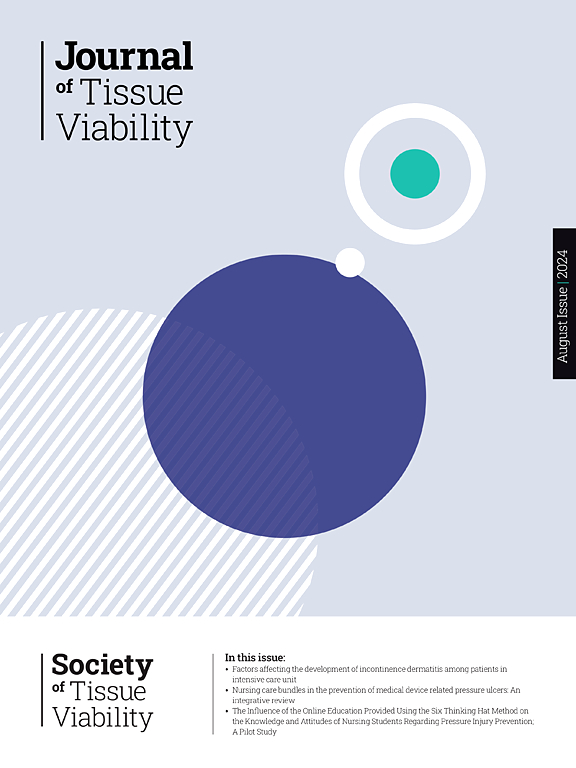Effectiveness of plant and animal-based interventions in preventing and reducing pressure injuries: A systematic review and meta-analysis
IF 2.4
3区 医学
Q2 DERMATOLOGY
引用次数: 0
Abstract
Background
Pressure injuries (PIs) are a significant concern among the elderly and bedridden patients, often resulting from prolonged pressure on the skin. Various interventions, including plant and animal-based therapies, are used to prevent and treat PIs. However, there is a lack of comprehensive understanding of the effectiveness of these natural interventions.
Aim
This study aims to systematically review and conduct a meta-analysis of studies using plant and animal-based interventions to prevent and treat pressure injuries.
Methods
A systematic review and meta-analysis were performed according to the PRISMA guidelines. Searches were conducted in PubMed, Web of Science, SCOPUS, and Cochrane databases using keywords related to pressure injuries and natural interventions. Studies published between 2003 and 2023 were included. The inclusion criteria were experimental, quasi-experimental, and case-control studies. Data extraction and quality assessment were performed independently by two researchers. The effect size was calculated using Hedges' g, and heterogeneity was assessed using Cochrane Q and I2 tests.
Results
A total of 13,563 records were identified, with 20 studies meeting the inclusion criteria after screening and full-text review. The total sample size was 2541 participants. The meta-analysis revealed a significant overall effect size (g = −0.614, 95 % CI: −0.890 to −0.337) indicating moderate effectiveness of plant and animal-based interventions in preventing and reducing PIs. Aloe vera, olive oil, and fish oil showed significant effects with p-values <0.05. High heterogeneity was observed among the studies (Q = 91.007, p < 0.05; I2 = 79.123 %), leading to the use of a random effects model.
Conclusions
Plant and animal-based interventions are moderately effective in preventing and reducing pressure injuries. These findings support the integration of natural therapies into clinical practice for PI management. Further research is needed to standardize protocols and explore the long-term effects of these interventions.
植物和动物为基础的干预措施在预防和减少压力伤害的有效性:系统回顾和荟萃分析
压力性损伤(PIs)是老年人和卧床不起的患者非常关注的问题,通常是由于皮肤长期受压造成的。各种干预措施,包括以植物和动物为基础的疗法,用于预防和治疗pi。然而,人们对这些自然干预措施的有效性缺乏全面的了解。目的对植物和动物干预预防和治疗压力性损伤的研究进行系统回顾和荟萃分析。方法根据PRISMA指南进行系统评价和meta分析。在PubMed、Web of Science、SCOPUS和Cochrane数据库中使用与压力损伤和自然干预相关的关键词进行检索。2003年至2023年间发表的研究也被纳入其中。纳入标准为实验性、准实验性和病例对照研究。数据提取和质量评估由两名研究人员独立完成。效应量采用Hedges' g计算,异质性采用Cochrane Q和I2检验评估。结果经筛选和全文审阅,共纳入文献13563篇,符合纳入标准的文献20篇。总样本量为2541名参与者。荟萃分析显示,总体效应值显著(g = - 0.614, 95% CI: - 0.890至- 0.337),表明植物和动物干预措施在预防和减少pi方面效果中等。芦荟、橄榄油和鱼油的影响显著,p值为0.05。研究间存在高度异质性(Q = 91.007, p <;0.05;I2 = 79.123 %),导致使用随机效应模型。结论以植物和动物为基础的干预措施对预防和减少压力性损伤具有中等效果。这些发现支持将自然疗法整合到PI管理的临床实践中。需要进一步的研究来规范方案并探索这些干预措施的长期影响。
本文章由计算机程序翻译,如有差异,请以英文原文为准。
求助全文
约1分钟内获得全文
求助全文
来源期刊

Journal of tissue viability
DERMATOLOGY-NURSING
CiteScore
3.80
自引率
16.00%
发文量
110
审稿时长
>12 weeks
期刊介绍:
The Journal of Tissue Viability is the official publication of the Tissue Viability Society and is a quarterly journal concerned with all aspects of the occurrence and treatment of wounds, ulcers and pressure sores including patient care, pain, nutrition, wound healing, research, prevention, mobility, social problems and management.
The Journal particularly encourages papers covering skin and skin wounds but will consider articles that discuss injury in any tissue. Articles that stress the multi-professional nature of tissue viability are especially welcome. We seek to encourage new authors as well as well-established contributors to the field - one aim of the journal is to enable all participants in tissue viability to share information with colleagues.
 求助内容:
求助内容: 应助结果提醒方式:
应助结果提醒方式:


